
Icicles form on the grille of a Ford vehicle on a dealer's lot in Omaha, Neb.
Ford Motor Co., despite losing more than $26 billion over the last two years, still has no intention of asking for government assistance but will instead draw down $10.1 billion in existing credit lines.
"It's a very volatile market," says Ford Chairman Alan Mulally. "It's not in our plan at all to access federal funds," he said even though "business conditions have deteriorated around the world more rapidly than expected."
Ford reported it lost $5.9 billion, or $2.46 per share, in the fourth quarter of 2007 due to declining domestic demand, restructuring charges and losses at its overseas subsidiaries. For the full year Ford lost $14.6 billion as it revenues shrank by 36 percent. (See the top 10 financial collapses of 2008.)
The latest losses, Ford's already steep mountain of debt — some $26 billion — and the industry's shaky financial condition are all stirring anxiety among investors, lenders, and potential car buyers. Yet Mulally stresses that Ford is in a better strategic position than its struggling rivals.
GM and Chrysler are expected to present preliminary plans to the Treasury by Feb. 17 demonstrating their viability, and final plans in March. If either of those plans fails to convince the federal government, a bankruptcy filing could follow. Such a huge negative event might prompt Ford to reconsider its position, says Mulally, but otherwise it expects to avoid asking for emergency federal aid.
Even without the government's help, Ford has gotten the United Auto Workers to abolish the jobs bank just as the UAW agreed to do at GM and Chrysler. The automaker is moving aggressively to contain costs — it expects still more concessions from the UAW — and actually reduced the losses at its critical North American unit despite a 36 percent drop in revenue. In addition, Ford gained market share in the U.S. for three consecutive months December 31st for the first time in 12 years.
"There clearly is a restructuring of the automobile industry," Mulally says. "The government wants to see a viable industry in the United States. We're talking to all the stake holders." Mulally expects Ford's outflow of cash to ease in the second half of the year as the stimulus package begins to take hold and consumer demand picks up.
Ford is also counting on new technology and new products, such as the 2010 Mustang, to help anchor its comeback; it expects to invest $14 billion in research and development over the next couple of years. At least $5 billion of that will come from the money doled out by the U.S. Department of Energy to finance the development of new fuel efficient technology under the 2007 Energy Act. "We don't know the exact timing [for the low-interest loans] but we think its going to be relatively soon," said Mulally.
A Brief History of the Electric Car
